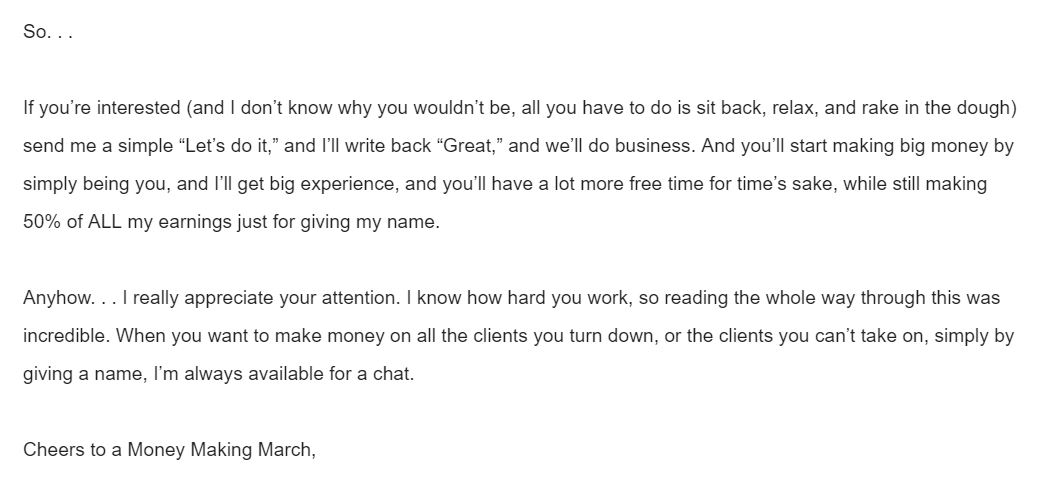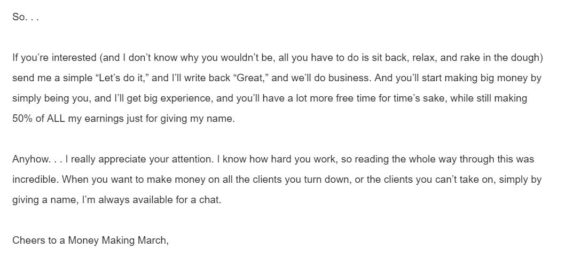Here’s Why Newbie Copywriters Should Never Send Canned E-mails to Fellow Copywriters


As a copywriter who has a decent digital presence, I get all manner of spammy offers through my website. Between the standard junk-mail pitches for attaining the elusive number 1 rank in Google search, growing my followers by the trillions in just thirty days, and boosting my income with Viagra sales, I’m seeing a lot more of one especially pernicious type of spam: newbie copywriters trying to break into the business with “get ready for the deal of a century” canned e-mails.
Now, I’m not against young, inexperienced writers asking seasoned pros for help. In fact, I think it’s smart to connect with people who might be able to refer work to you, or, if you make the effort to speak on a personal level to the pro in question, might be willing to mentor you (as one young copywriter asked me to do recently, and I said yes). But rather than showing me why you’re worthy of job referrals, sending a canned e-mail tells me only that:
- You read Copyblogger.
- You’re well-versed in the clichés of copywriting.
- You’re a little sketchy on proper punctuation.
- You haven’t taken the time to read my website or get to know anything about me or my clients, and are probably sending the same message to every copywriter you could find on the first few pages of Google search.
Let’s break it down with an actual e-mail I received recently.
Subject line:
Hey Robin! We’re both copywriters. I want to give you more time and $$…
This, newcomers, is not the way to approach a veteran e-mail copywriter (or even a veteran direct mail copywriter). If it sounds like messaging we would’ve used ten or even twenty years ago, we’re likely to be skeptical before we even open the message. Also, comma, meet direct address.
I know you’re super busy changing the way the world sees advertising. There’s simply not many people like you, laboring day-in day-out at unconscionable levels of creativity, to make advertising look and feel so damn good.
My name is Joe Copywriter. I’m a copywriter living in A Great Place. I’ve written dozens of spec pieces after studying the greats, Bernbach, Ogilvy, Catalano (ahem), and put the best of them online at MyWebsiteFullofSpecStuff.com. I’m coming from fiction writing, so I have to break myself in, you know?
I do know. In fact, I’ve been there myself. But you’re not being clever by blowing smoke up my behind. It’s irritating, not flattering.
I found your website and said to myself, “Hey, look at this creative, this self-made artist, Nietzsche’s Übermensch, making the world better, one word at a time.” You’re the image of success infecting the public’s minds. A true entrepreneur, creator of things.
Ambition like yours inspires me. You make success seem simple. “If you can’t explain it to an 11 year old, you don’t understand it well enough yourself.” So true. Simple is clever. That’s like my mantra.
As Liz Lemon might put it:

First, if my he-she name confused you, check out my head shot on the homepage to determine whether the term Übermensch could apply to me. Second, I’m not sure where that “If you can’t explain it to an 11 year old” quote came from, but it wasn’t my site.
What this tells me: You have created a semicustomized piece of spam, in which you can switch out a few bits of information for each person you’re addressing. Are we feeling the personal connection yet?
I came up with the idea that instead of writing mind-shattering “Hire Me” letters to prospective clients, I would simply write an introductory letter to you….
You obviously have a lot of your plate. And sometimes you might get client after client emailing you, calling you, Skyping you, begging you to use your magic juices to cosmically enhance their businesses. We value clients. We love clients. But we can’t handle every single one all the time. Maybe you want to work on something else for a while, your other passions, enjoy life, travel. You certainly deserve it. But you still can’t burn the bridges with all those potential clients. So what do you do?
Being that we’re both professional word-slaying sales-lizards, I want to suggest this. That if you send me clients who you don’t want to work with for one reason or another, clients who are outside your niche, clients whom you just can’t take on right now, then I’ll pay you 50% commission on every single penny I earn from them.
We’ll get to that commission in a minute. Let’s pause to consider the common pitfall that every copywriter—newbie or vet—should avoid: overwriting. If you want me to listen to you, to seriously consider staking my own reputation by referring clients to you, let’s dispense with all mentions of magic juices and word-slaying sales-lizards.
And about that punctuation: May I suggest a style guide? Or three?
This is a win win win, three times through. You win, because instead of pricing, say, $80 p/h, I can now price $180 p/h (depending on how much you price). So a twelve hour job would bring in $2160, with $1080 diving straight into your pocket, without you lifting a finger. I win, because I don’t have to look for clients, I cultivate a good relationship with you, and I can gain invaluable business experience. And the client wins, because I’m great at what I do, you’re great for referring me, and the end product is great. Dare I say, chuh ching?
Dare I say, WTF? I’m not sure what business guru or accounting textbook would recommend jacking up a standard rate 125% solely to give an untested subcontractor some business. Changing my hourly rate to accommodate you—whose work I will likely have to edit, if not redo, before it goes to the client—is not a win for me. And it’s not a win for the client, who will pay more than double for the privilege of on-the-job learning by a newbie copywriter (not to mention that the brand-new writer will make the same amount of money as the seasoned pro). What this really adds up to is bad business practice.
So. . .
If you’re interested (and I don’t know why you wouldn’t be, all you have to do is sit back, relax, and rake in the dough) send me a simple “Let’s do it,” and I’ll write back “Great,” and we’ll do business. And you’ll start making big money by simply being you, and I’ll get big experience, and you’ll have a lot more free time for time’s sake, while still making 50% of ALL my earnings just for giving my name.
Anyhow. . . I really appreciate your attention. I know how hard you work, so reading the whole way through this was incredible. When you want to make money on all the clients you turn down, or the clients you can’t take on, simply by giving a name, I’m always available for a chat….
Brave a click here for the opportunity of the decade.
When I think about sourcing clients for a brand-new copywriter, instructing him or her on how to complete a project, charging my clients—who have put their trust in me—more than double my going rates, and supervising and possibly redoing the copywriter’s work, opportunity of the decade is not in the top 100 phrases that come to mind.
It may seem like I’m being a bit hard on this young writer, who is, after all, just trying to find work. Having been there myself, I know how bad that sucks. But you know what else sucks? Being treated as if you’re simple-minded enough to confuse a shit sandwich for gourmet cuisine.
This is not to say that newbie copywriters shouldn’t try to reach out to professionals who might help advance their career. By all means do—but do it personally, one at a time, even though this means more legwork on your end.
More specifically: Network with us in person whenever possible. If we teach or do public speaking, attend one of our seminars. Make the effort to learn a little about our approach and the types of clients we work with, and be ready to talk about it. Don’t make nonsensical offers. Be willing to work for less in the early stages.
And ditch the canned e-mails and the faux flattery for something polite, personalized, direct, and, for the love of all that’s good and holy, brief.
Like what you’ve read? There’s more where that came from on Instagram, Facebook, and LinkedIn.